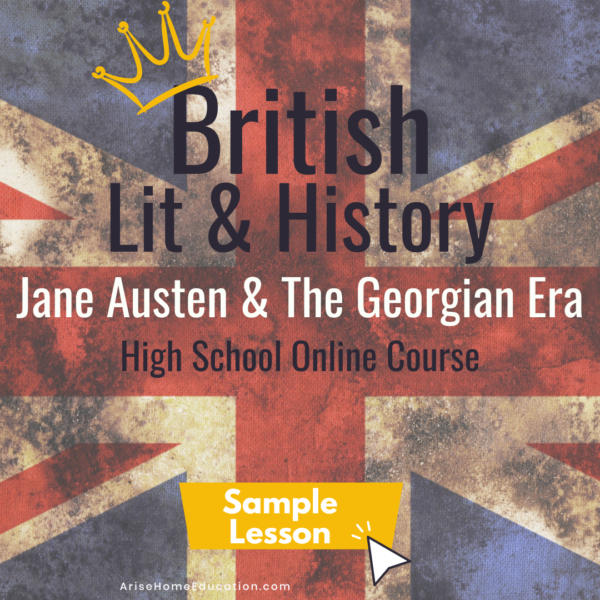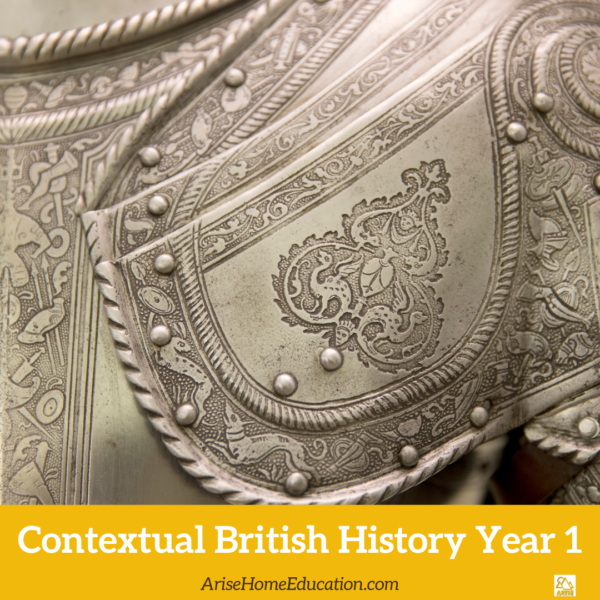8 Things Every Homeschooler Should Know About Jane Austen & Georgian Era History
With all the holiday activities and festivities of the winter months, it’s easy to understand why celebrating Jane Austen’s December birthday is not on most homeschooler’s to-do lists. And, let’s be honest, it’s more delightful to enjoy Jane’s contributions to Georgian era history with a summer picnic or a spring tea whilst reading her novels or learning about the history of the Georgian era. Keep reading to learn about Jane Austen and grab the Georgian era history mini-lesson (with a bonus British Literature activity). It’s perfect for your literature-loving teens.
Jane Austen and the Georgian Era
Jane Austen was a famous English novelist who lived during the Georgian period (1714-1837). She is known for her witty and romantic novels, such as “Pride and Prejudice” and “Sense and Sensibility.” Born in 1775, Austen witnessed firsthand the social changes that were taking place in Great Britain during this era. The Georgian Era was a time of great social change in England, with a focus on fashion, art, and architecture. It was a period characterized by elegance, refinement, and a growing middle class. Yet, it was also a time of great conflict with the French Revolution, the Napoleonic wars, and the amazing inventions of the Industrial Revolution.
Homeschoolers can learn about Austen and Georgian Era history through literature, history, and cultural studies. Austen’s novels can provide a glimpse into the social norms and customs of the time period. Through her works, homeschoolers can explore the hierarchical society, the role of women, and the expectations placed on individuals based on their social class. Jane Austen’s keen observations and satirical wit offer valuable insights into the social dynamics of the Georgian Era.
A Fascinating Glimpse into British History
High school teens can also delve into the art and architecture of the Georgian Era. The neoclassical style was prevalent during this period, with a strong influence from ancient Greece and Rome. Homeschoolers can study the elegant designs of Georgian buildings, characterized by symmetry, proportion, and attention to detail. They can also explore the works of renowned Georgian architects, such as Robert Adam and John Nash, who left a significant mark on the architectural landscape of the time.
Jane Austen and Georgian Era history offer homeschoolers a rich and fascinating glimpse into the past. Through Austen’s novels, homeschoolers can gain an understanding of the social dynamics and customs of the time period. They can also explore the famous people, political history, and historical conflicts that defined the Georgian Era, with an emphasis on the Regency Era. By studying Austen and Georgian Era history, homeschoolers can develop a deeper appreciation for this important period in British history leading up to the Victorian Era.
The Life and History of Jane Austen: Key Facts for Homeschoolers
- Jane Austen was born in 1775 in Steventon, England. She grew up in a close-knit family with her sister Cassandra and was the seventh of eight children. Jane and Cassandra had a special bond and were each other’s confidants throughout their lives.
- She started penning stories and plays as a child, often entertaining her family with her creative imagination. As she grew older, Austen’s writing skills continued to develop.
- Jane died at the age of 41. She completed six novels during her short lifetime. Her most famous works include Pride and Prejudice and Sense and Sensibility, which are still widely read and cherished today.
- Jane Austen’s novels are typically set in the English countryside. Her stories often revolve around the lives of the upper-middle class, exploring themes of love, social status, and the constraints placed on women in society during that era.
- Austen’s keen observations and witty commentary on the human condition have made her novels timeless classics.
- Despite her literary success, Jane Austen never married and lived with her family until her death in 1817.
- She drew inspiration from her own experiences and observations of the world around her.
- Today, Austen is considered one of the greatest writers in English literature. Her novels continue to captivate readers worldwide, enchanting them with her insightful portrayals of love, class, and society.
Understanding Jane Austen’s Cultural Impact: Relevance Today
Jane Austen’s novels continue to captivate readers because they are timeless, offering insight into human behavior that is still relevant today. Austen’s depictions of social class, love, and marriage shed light on how these concepts were understood in Regency-era England, but they also resonate with modern audiences. Despite the passage of time, the universal themes explored in Austen’s works remain relatable and thought-provoking.
Students studying Austen can benefit from exploring the historical context of her novels, gaining a deeper understanding of the societal norms and expectations that shaped her characters’ lives. By examining the class divisions and social hierarchies prevalent in Austen’s time, students can draw connections to contemporary issues of inequality and discrimination. Moreover, analyzing the ways in which adaptations and spin-offs have interpreted Austen’s work for modern audiences allows students to engage with the ongoing cultural impact of her stories.
Austen’s emphasis on the importance of female education, independence, and self-expression is particularly poignant in today’s world. Her heroines challenge societal conventions and strive for autonomy, providing an empowering message that resonates with readers across generations. In an era where gender equality and women’s rights are still being fought for, Austen’s portrayal of strong, intelligent female characters serves as an inspiration and reminder of the ongoing struggle for gender equity.
Reading Austen’s novels not only offers an escape from modern-day stressors but also provides an opportunity to reflect on larger social issues. By delving into the intricacies of Austen’s characters and their relationships, readers can examine their own beliefs and attitudes toward love, marriage, and social dynamics. Austen’s astute observations about human nature and her ability to paint vivid pictures of her characters’ lives make her works a timeless source of insight and enjoyment for readers today.
-
Product on sale
 Jane Austen & The Georgian Era Sample LessonOriginal price was: £12.00.£0.00Current price is: £0.00.
Jane Austen & The Georgian Era Sample LessonOriginal price was: £12.00.£0.00Current price is: £0.00.
Let’s Study Jane Austen: Free Mini-Lesson
Let’s study Jane Austen! Jane Austen’s novels are set in the late 18th and early 19th centuries in England, providing readers with an immersive experience of the Regency era. Her most famous works, including Pride and Prejudice, Sense and Sensibility, and Emma, have captivated audiences for generations.
Austen’s novels often delve into themes that are still relevant today, such as marriage, social class, and the role of women in society. Through her storytelling, she offers astute observations and critiques of the societal norms and expectations of her time. Her witty and satirical writing style enhances the reader’s engagement with the characters and their struggles, making her works both entertaining and thought-provoking.
Not only have Austen’s novels stood the test of time in written form, but they have also been adapted into numerous film and TV adaptations. One of the most notable adaptations is the 1995 BBC miniseries of Pride and Prejudice, which helped introduce Austen’s works to a wider audience. These adaptations bring Austen’s characters and settings to life, further enriching the reading experience.
When teens read and study Austen’s works, they gain valuable insight into the social and cultural norms of Regency-era England. It allows readers to explore the intricacies of courtship, marriage, and the expectations placed upon individuals based on their social class. Additionally, Austen’s works shed light on the limited roles and opportunities available to women during that time, sparking discussions on gender inequality and societal expectations.
Immerse yourself in Jane Austen’s world, and you’ll find yourself transported to a time of intricate social dynamics, witty dialogues, and timeless themes. Whether you’re a longtime fan or discovering Austen’s works for the first time, studying her novels will undoubtedly provide a captivating and enlightening experience.
Jane Austen’s Legacy for Homeschoolers and Beyond
Jane Austen’s novels provide valuable insight into the social norms and expectations of the Regency era. Through her keen observations and satirical wit, Austen highlights the rigid class structure and gender roles that defined the period. Homeschoolers can benefit greatly from studying her works, as they offer a window into a different time and place, fostering a deeper understanding and appreciation of history. By delving into Austen’s novels, homeschoolers can gain a broader perspective on societal norms and the impact they have on individuals.
Additionally, Austen’s works are full of wit, humor, and relatable characters that can captivate homeschoolers of all ages. Whether it’s the misadventures of Elizabeth Bennet in “Pride and Prejudice” or the romantic entanglements of Emma Woodhouse in “Emma,” Austen’s stories have a timeless appeal. Homeschoolers can relate to the struggles, aspirations, and triumphs of Austen’s characters, learning important life lessons along the way. Austen’s ability to create complex and multidimensional characters provides homeschoolers with a diverse range of personalities for literary analysis.
The Importance of Studying History & Literature Together
Homeschooled teens can learn about the importance of self-reflection, self-improvement, and the power of love and friendship from Austen’s novels. Austen’s heroines often undergo personal growth, learning from their mistakes and ultimately becoming stronger individuals. Through her stories, Austen emphasizes the value of introspection and the pursuit of personal betterment. Homeschoolers can draw inspiration from Austen’s characters as they navigate their own journeys of self-discovery and development. Additionally, Austen’s emphasis on the power of love and friendship reminds homeschoolers of the importance of meaningful connections in their own lives.
Jane Austen’s legacy has inspired countless adaptations, movies, and TV shows that offer a fun and engaging way to introduce homeschoolers to her work. Through visual mediums, homeschoolers can immerse themselves in Austen’s world, experiencing the settings, costumes, and dialogue that bring her stories to life. These adaptations not only entertain but also provide homeschoolers with valuable opportunities to analyze and compare different interpretations of Austen’s works. By engaging with these adaptations, homeschoolers can further develop their critical thinking, writing, and communication skills.
Finally, Jane Austen’s timeless wisdom and universal themes can provide homeschoolers with a solid foundation for personal growth, character development, and lifelong learning. By exploring the complexities of human relationships, societal expectations, and personal values in Austen’s novels, homeschoolers gain valuable insights that can shape their own moral compass and worldview. Austen’s works encourage homeschoolers to question societal norms, think critically about their own beliefs, and develop a sense of empathy and understanding for others. With Austen as their guide, homeschoolers can embark on a lifelong journey of personal growth and intellectual development.
-
Product on sale
 Jane Austen & The Georgian Era Sample LessonOriginal price was: £12.00.£0.00Current price is: £0.00.
Jane Austen & The Georgian Era Sample LessonOriginal price was: £12.00.£0.00Current price is: £0.00. -
 Self-Paced Contextual British History: Georgian Era£70.00
Self-Paced Contextual British History: Georgian Era£70.00 -
Product on sale
 British Lit & Comp Year 1-Shakespeare & Austen – Live ClassOriginal price was: £320.00.£180.00Current price is: £180.00.
British Lit & Comp Year 1-Shakespeare & Austen – Live ClassOriginal price was: £320.00.£180.00Current price is: £180.00. -
Product on sale
 Contextual British History Year 1 – Tudor & Georgian Era – Live ClassOriginal price was: £320.00.£180.00Current price is: £180.00.
Contextual British History Year 1 – Tudor & Georgian Era – Live ClassOriginal price was: £320.00.£180.00Current price is: £180.00.
Contextual British History of the Georgian Era through the Lens of Jane Austen
In this high school British history online class, teens will not only learn about the culture and customs of the Georgian era, they will also deep dive into the lives of Jane’s contemporaries. Teens will study nearly 40 additional famous people from around the world who were alive in this same time period using Let’s Study Jane’s Regency Era. They will also study historical events that shaped the eighteenth century and the British Empire. By combining British literature and history of the Georgian era, teens will learn about:
- Lord Byron
- William Blake
- John Keats
- Jonathan Swift
- William Wordsworth
- The Jacobite Rebellion, The Battle of Culloden in Scotland, and of course Bonnie Prince Charlie
- Napoleon Bonaparte and the Battle of Waterloo and the Napoleonic Wars
- The French Revolution and
- The American Revolution (aka American War of Independence)
- The Battle of Trafalgar
Teens enroling in the live, online classes will also learn social values, Georgian style, and manners so important in English society life. There will also be the opportunity for a better understanding of social reform, the upper class, and the impact of conflict and invention on people living in rural areas during the agricultural revolution of the later 18th century in the United Kingdom, but also in North America, due to slave trade, and throughout Europe during this period of British History.
By engaging in interactive lessons and activities students will learn the key events of the Georgian era alongside the classic novels of Jane Austen and Romantic poets that called Georgian Britain their home. Unpack English history in a unique way with Contextual British History of the Georgian Era and its companion course in British Literature.
-
Product on sale
 Jane Austen & The Georgian Era Sample LessonOriginal price was: £12.00.£0.00Current price is: £0.00.
Jane Austen & The Georgian Era Sample LessonOriginal price was: £12.00.£0.00Current price is: £0.00. -
 Self-Paced Contextual British History: Georgian Era£70.00
Self-Paced Contextual British History: Georgian Era£70.00 -
Product on sale
 British Lit & Comp Year 1-Shakespeare & Austen – Live ClassOriginal price was: £320.00.£180.00Current price is: £180.00.
British Lit & Comp Year 1-Shakespeare & Austen – Live ClassOriginal price was: £320.00.£180.00Current price is: £180.00. -
Product on sale
 Contextual British History Year 1 – Tudor & Georgian Era – Live ClassOriginal price was: £320.00.£180.00Current price is: £180.00.
Contextual British History Year 1 – Tudor & Georgian Era – Live ClassOriginal price was: £320.00.£180.00Current price is: £180.00.


